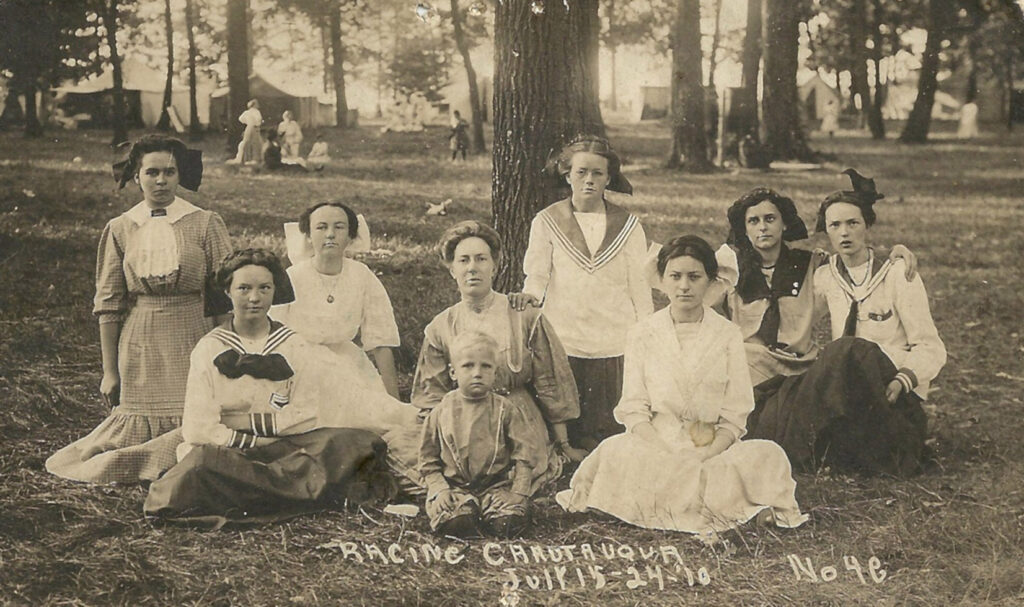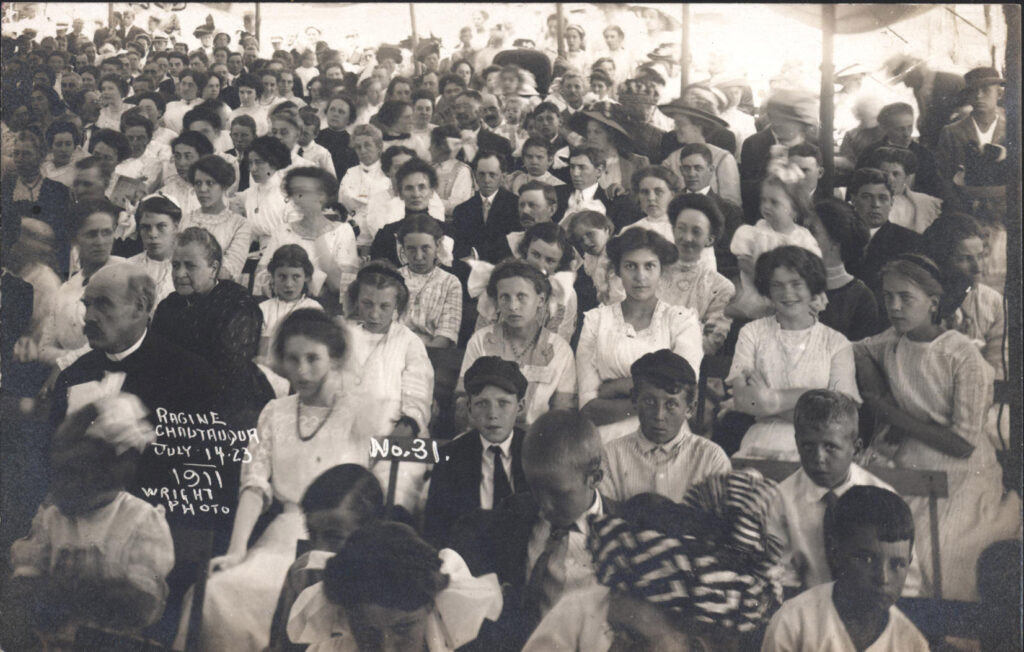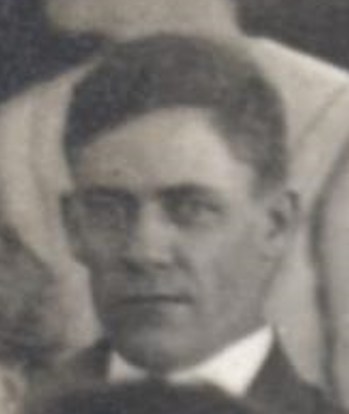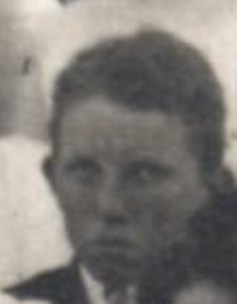From Wikipedia: Chautauqua (/ʃəˈtɔːkwə/ shə-TAW-kwə) was an adult education and social movement in the United States, highly popular in the late 19th and early 20th centuries. Chautauqua assemblies expanded and spread throughout rural America until the mid-1920s. The Chautauqua brought entertainment and culture for the whole community, with speakers, teachers, musicians, showmen, preachers, and specialists of the day.[1] Former U.S. President Theodore Roosevelt was quoted as saying that Chautauqua is “the most American thing in America.”[2]

From Catherine Kirk’s photo collection.
The Racine Daily Journal, June 11, 1903
Program for the Chautauqua Out
Official Outline of Proceedings to Occur During Gathering From July 4 to 13.
William J. Bryant to Deliver an Address
Madame Tsilka and Baby Among the Attractions — Stereopticon Views, Concerts and Varied Numbers Make Up the List.
The Racine Journal-News, Friday Afternoon, September 19, 1913
Racine Chautauqua Movement Will Die
Association at meeting votes to disband and sell all property to pay its debts — formation of new association is urged but no action taken.
Racine is to have no more chautauqua assemblies unless a new association is formed immediately and new grounds obtained as the members of the Racine Chautauqua association last evening took the preliminary steps of dissolving the present association as soon as the assets can be disposed of and the outstanding debts paid. This action was taken following the report of the president, J. Hocking, and the secretary, O. F. Botsford, who both strongly urged the dissolution of the Chautauqua association on the grounds that the patronage was not sufficient to meet the expenses; that the contracts with the owners of lots in the Chautauqua grounds had expired, and that the people to the west of the Chautauqua grounds were clamoring for the opening of streets through the grounds.
Many Would Sell
It was pointed out that many of the owners of lots in the Chautauqua grounds had moved to other cities and were no longer interested in the continuance of the assembly. These people wish to dispose of their lots and are to throw them on the market now that their agreement with the association has expired. When the Chautauqua association was formed some eight years ago a number of men banded together and purchased lots in the beautiful grove off West Sixth street, where the annual assemblies have been held. They entered an agreement not to dispose of their holdings until Sept. 18, 1913. Mr. Botsford stated at the meeting that he had received letters from a large number of lot owners, saying that they would not extend this time but would take immediate action to sell their lots.
Want Streets Opened.
The residents living to the west of the Chautauqua grounds have already petitioned the city council to open up the streets running through the grounds. It is probable that these petitions will be grand at once and this action would spoil the grounds for Chautauqua purposes. Contract Hanson was engaged by the Chautauqua association to canvass the residents of this district and see if they would agree not to demand the opening of these streets. A complete canvass of the neighborhood failed to find a single property owner who would make this agreement.
The Racine park board and the city council were roundly scored at the gathering for not taking some action whereby the city could obtain the Chautauqua property for a city park. One member present said: “It would make a lot finer park than the old river bottom in which the city is sinking a lot of money.”
Superintendent Nelson sent a communication to the president of the association in which he stated that he had been in communication with members of the park board urging them to take some action to save the beautiful grove and that he had been informed that the city council would absolutely refuse to do so. Mr. Nelson termed this action “a short sighted policy which has cost the city much in the past.”
Finances Are Low
The treasurer’s report showed that the association only has a few dollars in the treasury and has debts that total up to approximately $700. Of this amount, $500 is owed to the Chautauqua Managers association for last season’s talent. Mr. Botsford went to Chicago recently to see if some reduction could not be secured. He was offered a reduction of $100 in cash or if he preferred to take it out in talent the company was willing to stage six entertainments here this winter and to give the local association half the proceeds. As Racine people will have several entertainment courses this winter it was feared that this latter project would fail and so upon resolution it was decided to accept the $100 rebate.
The deficit was caused, it was said, because the talent offered last year was of a higher class than ever before and cost all together $2,206, while in other year the talent was secured for about $1,700. In spite of the high class attractions provided the attendance was not increased. It was said that the same people attending the Chautauqua here every year and that had the old style entertainment been provided the association would have come out even.
Would Sell All
After hearing the various reports, W. G. Gittings moved that the assets of the association, consisting of one $700 lot, one large tent valued at about $100, all of the seats, tools, buildings, etc., used in connection with the assemblies be disposed of in order to meet the liabilities and that the association be formally wound up and dissolved. This resolution met with the approval of the twenty-seven member present and was unanimously passed. The president, by an amendment, was authorized to appoint a committee of three to dispose of the assets. He appointed on this committee John Dixon, W. A. Walker and B. Heinricks.
Mr. Botsford and Mr. Hocking wished to resign their positions at once, but it was pointed out to them that by doing so they would make it necessary to elect a new board of directors, new officers and take out new articles of incorporation, as the association will have to remain in existence until the assets can be disposed of in order to make this action legal. By retaining their offices, pro tem, however, this bother would be saved, and so it was decided to retain the present officers and directors in spite of the fact that in reality the association ceased to exist after last night.
Deplore the Move
Most of the members present deplored the necessity of breaking up the Chautauqua association, some of them even going so far as to offer to turn their lots over to the city providing the grounds were retained for park and Chautauqua purposes. Others were delighted with the prospect of turning their holdings into cash and one man went so far as to suggest suing the association for the payment of taxes on his lot for this year. He said that when the lot owners turned their lots over to the association the association promised to pay the taxes. He pointed out the fact that the association had the use of his lot this season and so should be made to pay the taxes, and threatened legal proceeding if it did not. It was suggested at the gathering that action be started soon to form a new Chautauqua association. Nothing definite was done on the project.
The gathering finally adjourned, subject to the call of the president.
Jim Peck: Chautauqua exists and thrives. Every summer, for nearly 150 years, thousands of folks from around the world gather at the Chautauqua Institute in western New York for nine weeks. Our family has been going for nearly 20 years. Unfortunately Chautauqua suffered a tragic event this past summer when Salman Rushdie was attacked on its amphitheater stage but he was saved by members who rushed to his aid. It has been called America’s Brigadoon.




